IMPLICATIONS OF THE SARFAESI ACT ON BORROWERS AND GUARANTORS
The Securitisation and Reconstruction of Financial Assets and Enforcement of Security Interest Act, 2002, commonly known as the SARFAESI Act, was introduced by the Indian government as a tool to address the problem of non-performing assets (NPAs) in the banking sector. The act provides the legal framework for banks and financial institutions to recover their dues from borrowers and guarantors by enforcing their security interest in the form of hypothecation, mortgage, or pledge.
While the SARFAESI Act has helped banks and financial institutions to recover their bad loans, its implications on borrowers and guarantors cannot be ignored. In this article, we will discuss the implications of the SARFAESI Act on borrowers and guarantors.
- Loss of Property: The SARFAESI Act allows banks and financial institutions to take possession of the security provided by the borrower or guarantor in case of default. The Act provides for the sale of the property through a public auction to recover the outstanding dues. This means that borrowers and guarantors may lose their property if they fail to repay the loan.
- Limited Legal Remedies: The SARFAESI Act provides for limited legal remedies to borrowers and guarantors. The Act does not provide for any judicial intervention in the recovery process until the bank or financial institution takes possession of the property. This means that borrowers and guarantors cannot approach a court for relief until their property is taken over by the bank or financial institution.
- Impact on Credit Score: Defaulting on a loan has a negative impact on the borrower’s credit score. The SARFAESI Act allows banks and financial institutions to report defaulters to credit information companies, which may affect the borrower’s ability to obtain credit in the future.
- Harassment by Banks: While the SARFAESI Act provides for the recovery of dues, it has been observed that some banks and financial institutions resort to unfair practices to recover their dues. Borrowers and guarantors have reported instances of harassment by banks and financial institutions, which can have serious implications on their mental and emotional well-being.
- No Provision for Settlement: The SARFAESI Act does not provide for any settlement mechanism between the borrower or guarantor and the bank or financial institution. This means that the borrower or guarantor has to pay the full amount outstanding to avoid the sale of their property.
In conclusion, while the SARFAESI Act has provided banks and financial institutions with an effective tool to recover their dues, its implications on borrowers and guarantors cannot be ignored. The Act provides limited legal remedies to borrowers and guarantors, and its enforcement can have serious implications on their financial, mental, and emotional well-being. It is important for borrowers and guarantors to be aware of their rights and responsibilities under the Act and to seek legal advice if necessary.



